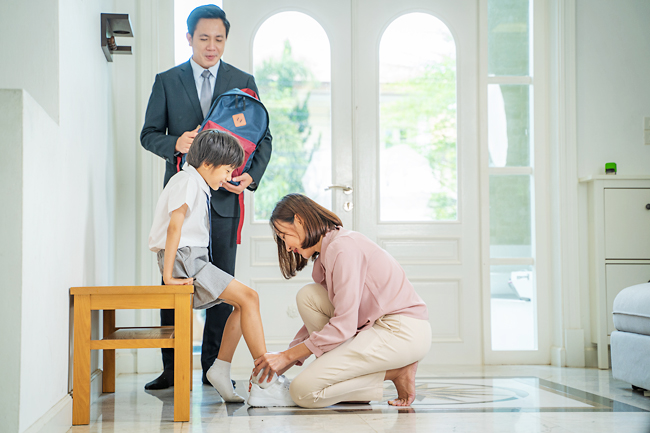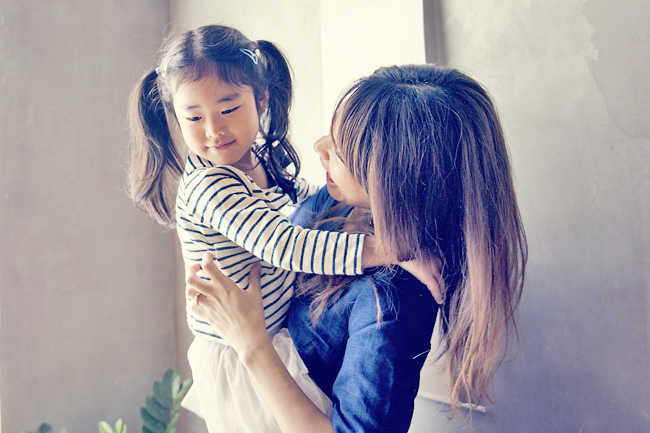ANN/THE STAR – One common complaint I hear from parents who drive their children to primary school is: “Oh dear, some of them take so long to drop off their kids. They have to get out of the car, put the bag on their back, kiss them goodbye… Meanwhile, we’re all just waiting in line!”
Welcome to the world of Asian parents, who love their children so much that they’re willing to hold up a line of cars. In the West, this might be referred to as “helicopter parenting”.
These are parents who focus all their attention and care on their children. They pack their bags and lunches in the morning, prepare their exercise clothes, and ensure they haven’t forgotten their homework.
Take, for example, this recent posting on social media in which a father says he noticed that the son had forgotten his school project.
Dad thought that if he allowed the boy to only realise it when they reached school, then perhaps the son would learn from his mistake.
“That bitterness as he walked to his classroom was horrible for me to watch, but necessary for him to grow up,” writes the father.



I noticed that many Malaysians who commented on this didn’t agree with the father. “If you parent like this and deliberately screw over your kid, you shouldn’t have kids in the first place,” wrote one.
“Teach your kid a lesson without having to embarrass them in front of peers.”
“Just taught his child to be selfish and never help other people in need.”
One is the concern that something like this will cause long-term damage to the relationship between parent and child. The other is that this father was cruel to humiliate and embarrass the child in front of others at school.
I pretty much disagree. In principle one should never be embarrassed to make mistakes because it’s a natural part of learning. An interview with mathematician James Maynard, who won the coveted Fields Medal in 2022 revealed how a genius like him does his day-to-day work: “It’s at least 99 per cent frustration. I’ll be like a toddler trying to walk for the first time, I’ll keep falling flat on my face,” he explained.
“The hope is that once you’ve gone through the 99 per cent frustration, you get one of those “yes!” moments.”
The moment is a result of struggling to navigate the mistakes made along the way. But if you haven’t learned to not just give up at the first mistake, or think that each mistake is an embarrassing failure, then it makes it a difficult and stressful journey. So if you’re trying to teach a child something but in the process you’re humiliating them, then you’re very probably getting it wrong.
Psychologists talk about two ways in which parents try to get their children to “behave”.
One is “parental behavioural control”, which refers to parenting through supervision, setting boundaries and rules, and exercising punishment if those rules are broken.
For example, you might tell a child, “If you keep biting your brother, I will have to put you on the other side of the room and you will have to play by yourself”. You set rules about acceptable and non-acceptable behaviour; you supervise, and when you see the limit has been overstepped you implement consequences. And you communicate why the rules are there (“It hurts your brother when you bite him”).
One huge benefit about clearly and consistently enforcing fair rules for children is that they then understand better what “good” behaviour is, which means eliciting such behaviour is more likely to succeed (because they know what needs to be done).
Studies show that it reduces anxiety while building self-esteem along the way (because kids are confident that what they’re doing is OK).
In contrast, a second method of exerting control is “parental psychological control”. This is when a parent tries to control a child’s behaviour by influencing their thoughts and feelings.
Often this takes the form of guilt (“That’s wrong, you’re a bad boy”) or by love withdrawal (“I hug your brother but not you because he’s a good boy but you’re not”).
For me, this also includes embarrassing a child by pointing out their shortcomings in front of others. Studies show that this can lead to emotional and behavioural problems, including anxiety, depression, and low self esteem.
For me it’s quite simple: How do you expect a child to learn from their mistakes if they don’t understand why it’s a mistake in the first place? And perhaps more importantly, what they can do to fix it?
If that father I mentioned before, in trying to help his son, loudly scolded him and made the boy feel bad about failing, then I feel that would not have been as helpful as getting the boy to understand that there are things he can do now to solve the problem at hand (for example, asking the teacher for an extension); and that there are things that can be done in the future to prevent this from happening again (for example, by getting his stuff ready the night before).
The problem, though, is that I think that Malaysia as a culture tends to not go for the “behavioural” method to manage its citizens, and tends towards the “psychological” method.
Parents take their time dropping off the kids? Nothing happens to them really when they do that, we just try to shame them in the parents’ chat group. What if you run a red light or speed on the highway? Yes, we’re meant to pay fines if we break laws, but very, very many people take their time paying them (and then the police offer “discounts”, further negating the consequences).
Even with larger issues like corruption, it feels like the line is blurry when deciding who to prosecute and who to leave alone, or who is found guilty and who isn’t (or even who has to stay in jail or gets to serve a sentence at home).
How can we expect people to be good citizens when we don’t really make clear what that means as a nation, and what the consequences are if we aren’t good citizens?
Ultimately, if it takes a village (or a country) to raise a child, then what kind of children are growing up in this region? – Dzof Azmi


